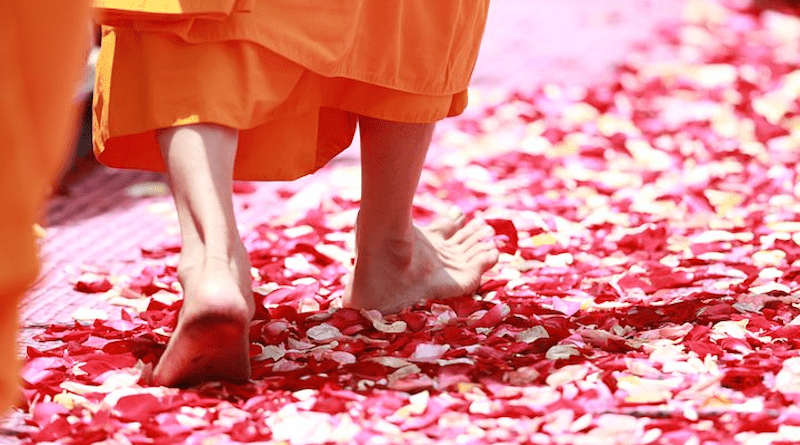Sacred Artifact Dispute Reveals Japan-Korea Tensions – OpEd

By UCA News
By Cristian Martini Grimaldi
(UCA News) — Long-standing tensions between Japan and South Korea have reached a symbolic peak over a Buddhist statue stolen from Kannonji Temple on the Japanese island of Tsushima and transported to South Korea in 2012. This is despite South Korea’s Supreme Court recently ruling in favor of its return.
Though a small group of individuals stole the statue, its fate has become a broader reflection of unresolved tensions that echo historical grievances dating back to Japan’s occupation of the Korean Peninsula.
Even though both governments formally signed a UNESCO convention mandating the return of the stolen cultural property, the South Korean government’s inaction has reignited the complex debate surrounding anti-Japanese sentiment in South Korea.
The Buddhist statue at the center of this controversy, the “Seated Statue of Avalokiteshvara Bodhisattva,” holds a special place in Japan as a designated cultural property of Nagasaki Prefecture.
It was stolen by a South Korean group in 2012, marking one of many artifacts removed from Japanese temples by South Korean thieves during a time when Tsushima’s temples and shrines were under repeated assault.
This theft wave led to intense anti-theft security measures across the island and fueled frustration among the Japanese population.
Korean authorities recovered the religious artifact in early 2013, but Buseoksa Temple in South Korea claimed ownership, arguing that the statue had been initially looted by Japanese pirates centuries ago.
In response, Kannonji Temple stated that it had acquired the statue legally during the Joseon Period to protect it from frequent iconoclasm. This position holds historical support given the extensive records of Korean iconoclastic acts in temples at that time.
The dispute over the statue, therefore, represents not just a question of ownership but an ongoing struggle over the memory of Japan’s occupation of Korea and how history is perceived on both sides of the East Sea.
This is far from the only point of contention between Japan and South Korea, as recent years have seen multiple diplomatic and economic disputes that underscore the fragility of their relationship:
For instance, South Korea’s Supreme Court ordered Japanese companies to pay reparations to Korean laborers forced to work during World War II, a ruling Japan strongly opposed. Japan argues that all reparation issues were settled in a 1965 treaty, but many in Korea see this as insufficient acknowledgment of historical wrongs.
And of course, in 2019, Japan placed export restrictions on materials vital to South Korea’s technology sector, officially citing security concerns. South Korea interpreted this as retaliation for the forced labor compensation rulings, resulting in a trade dispute that impacted high-tech industries in both countries.
And the most internationally known case of comfort women. South Korea has long demanded a more formal apology and compensation for the Korean women forced into sexual slavery by the Japanese military during the occupation.
While Japan has offered apologies and financial support over the years, South Korean public sentiment is that Japan’s remorse is thus incomplete. The topic often arises on anniversaries and at international forums, fueling resentment on both sides.
Let’s not forget the territorial disputes over the Dokdo/Takeshima Islands. Both countries claim sovereignty over the Dokdo (in Korean) or Takeshima (in Japanese) Islands, which are located in the Sea of Japan. This territorial dispute is another recurring issue that stirs up strong emotions, with both sides staging protests and diplomatic statements asserting their claims.
The recent resistance from South Korea to returning the stolen Buddhist statue demonstrates that its national identity is still fueled by lingering resentment toward Japan. This unwillingness to fully reconcile reflects a societal perspective in which Japan’s occupation of Korea from 1910 to 1945 remains a defining trauma.
For many South Koreans, Japan’s actions during the occupation are not merely historical facts but a reminder of a brutal period that shaped the nation’s modern identity.
South Korea’s national ethos continues to be influenced by historical remembrance, which, in some ways, also shapes the political landscape. Political leaders in South Korea occasionally evoke anti-Japanese sentiment to rally public support or to divert attention from internal challenges, a tactic that has successfully resonated due to the ingrained historical narratives.
The question of returning the Buddhist statue may seem like a small diplomatic matter, but it highlights the broader, unresolved issues between Japan and South Korea. While both nations are allies of the United States and share common concerns over regional security, including the threat from North Korea, their strained relations often limit real effective cooperation.
In the end, the fate of the Buddhist statue remains a powerful symbol of a fractured history that, even in modern times, still holds sway over both nations’ political and cultural landscapes. The broader question is whether Japan and South Korea can move beyond symbolic disputes to focus on a future that acknowledges but is not overshadowed by their shared past.
*The views expressed in this article are those of the author and do not necessarily reflect the official editorial position of UCA News.

China Restricts Young Tibetan Monks In ‘Prison-Like’ Schools
By UCA News
(UCA News) — Tibetans have accused the pro-Beijing authorities in the region of housing hundreds of young Tibetan Buddhist monks in prison-like conditions at government-run boarding schools, says a report.
The students forcibly transferred from the Kirti Monastery schools in Sichuan province’s Ngaba county are not even permitted to leave the school grounds or meet their parents, Radio Free Asia (RFA) reported on Oct. 31.
“Since being forcibly removed from the monastery, the students have been denied contact with their parents and receive inadequate medical care when ill,” RFA reported, citing an unnamed source.
“When parents request to meet their children, they are given various excuses about needing higher-level approval and ultimately face threats of imprisonment if they persist,” the unnamed source added.
The students between the ages of 6-17 are taught exclusively in Mandarin, RFA reported.
Some of the students who attempted to escape the school were apprehended and are now being treated “like criminals” and forbidden from leaving the school grounds.
Over 1,000 young Tibetan monks were transferred from the Kirti Monastery to state-administered “colonial style” boarding schools in July.
The authorities closed another school at Lhamo Kirti Monastery in Dzoge county, affecting some 600 students.x
The authorities had compelled parents to sign agreements ensuring that their children would be enrolled in government-run schools, where they would undergo state-approved “patriotic education.”
Pro-Beijing authorities in Tibet cite China’s regulations on religious affairs which mandate that the students at monastic schools must be 18 or older, display patriotism, and be compliant with national laws.
Tibetan critics of China’s communist-led government allege that these regulations are part of a broader policy to eradicate the use of the Tibetan language, suppress Tibetan culture, and enforce “patriotic education.”
China’s patriotic education policy mandates that the love of China and the ruling Chinese Communist Party be incorporated into work and study for all citizens.
The Chinese authorities in the region have also intensified surveillance and restrictions on Tibetans in Ngaba county following the school closures.
A high-ranking official from China’s United Front Work Department is permanently stationed in Ngaba for several months, overseeing control measures over both the monastery and the local community.
The authorities have also unleashed a crackdown on any form of communication with the outside world, RFA reported.
In October, the authorities in Dzoge seized the phones of monks and teachers of Lhamo Kirti Monastery, accusing them of sharing the news of school closures.
In September, the authorities arrested four Tibetans, including two monks from Kirti Monastery, as well as two laypersons in Ngaba, accusing them of contacting Tibetans outside the region.
The Chinese government has claimed that the communication between Tibetans and their family members and friends abroad undermines national unity as a reason for communication restrictions, RFA reported.
Tibetans have denounced Beijing’s surveillance, accusing the authorities of violating their human rights and trying to eradicate their religious, linguistic, and cultural identity.'

UCA News
The Union of Catholic Asian News (UCA News, UCAN) is the leading independent Catholic news source in Asia. A network of journalists and editors that spans East, South and Southeast Asia, UCA News has for four decades aimed to provide the most accurate and up-to-date news, feature, commentary and analysis, and multimedia content on social, political and religious developments that relate or are of interest to the Catholic Church in Asia.
No comments:
Post a Comment